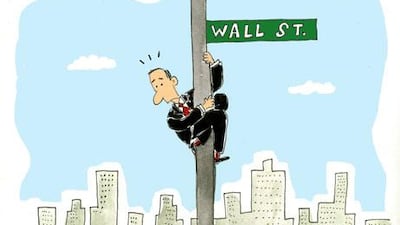The Occupy Wall Street movement in the United States is a surprise. Not that it's happened, but because it took so long for something like this to happen. Apparently, it was the Arab Spring that woke Main Street America up and got them out on the streets to protest against corporate greed. Not even Michael Moore, the American filmmaker, could do that with his revealing documentary Capitalism: A Love Story back in 2009, when it was released.
According to its website (www.occupywallst.org), the movement is a "leaderless resistance movement with people of many colours, genders and political persuasions".
It goes on to say "that We Are The 99% that will no longer tolerate the greed and corruption of the 1%. We are using the revolutionary Arab Spring tactic to achieve our ends and encourage the use of nonviolence to maximise the safety of all participants."
Their word has spread, mainly through social media such as Twitter, and the protests have extended to about 70 or so cities in the US now. It's good to see Americans finally take a stand. After all, the US economy is going down the tube, the government has struggled to pay its sovereign debt, millions of people have lost their jobs and just as many have lost their homes because of the subprime crisis, which was one of the earliest signs of the 2008 global financial crisis.
But if you look back at the events of the past three years, using the start of the global economic downturn as your marker, there were a number of things that should have woken them up long before the Occupy Wall Street movement kicked off its first protests nearly four weeks ago.
A perfect example is the Troubled Asset Relief Program (Tarp), cooked up by George W Bush and his cronies to throw a lifeline to a Wall Street that was teetering on the brink. There they were, the bankers, begging bowls out, as they stood solemnly behind Bush when he made the Tarp announcement. What the bankers did next was unthinkable, despite their promises. I wrote about it in this column in February; here's what I said:
"Probably the best example of a monumental misuse of taxpayer dollars was in the US during the height of the financial crisis: the controversial US$700 billion (Dh2.5 trillion) Troubled Asset Relief Program (Tarp). The Bush government magnanimously threw Wall Street the Tarp lifeline in October 2008 to save the country's banks, which then enabled them to continue calling in troubled mortgages from low-income earners or people who had lost their jobs thanks to the subprime debacle, caused, of course, by the lenders themselves.
"A year ago, Reuters reported that the US government's bailout watchdog said in its quarterly report to Congress that while Tarp was supposed to encourage banks to increase financing for US businesses and consumers, lending had decreased on a month-by-month basis.
"Preserving homeownership and promoting jobs were also 'explicit purposes' of the Emergency Economic Stabilization Act of 2008 that enabled Tarp, Reuters added. But the 'unemployment rate remained at 10 per cent and only a small fraction of troubled mortgages have been permanently modified to lower borrowers' monthly payments'.
"Now that's an interesting way to thank the people, rather than, say, being a little humane about it and giving them back their homes or, at the very least, some breathing space to catch up on their payments."
If only the Occupy Wall Street movement was around when the banks were grabbing on to the Tarp lifeline. I know Michael Moore was and he criticised it heavily in his Capitalism: A Love Story documentary - but still, it appeared to be accepted as a fait accompli by the majority of the 99 per centers. Then again, they were probably too busy trying to find new jobs and homes at the time.
It's a shame, too, that Thomas Sargent and Christopher Sims, the two American academics who were this week awarded the Nobel Prize for economics, weren't in the news back then either. They won the Nobel for their "empirical research on cause and effect in the macroeconomy".
In layman's terms, the BBC says, this means they looked at how economic policy, such as raising interest rates or cutting taxes, affects macroeconomic variables, such as GDP and inflation.
Perhaps they could have warned the US government that its quantitative easing mark I and II, in which it spent billions of dollars desperately trying to boost the economy by buying up government bonds, wouldn't be as successful as it hoped. But that's hindsight for you.
In the meantime, power to the people.


